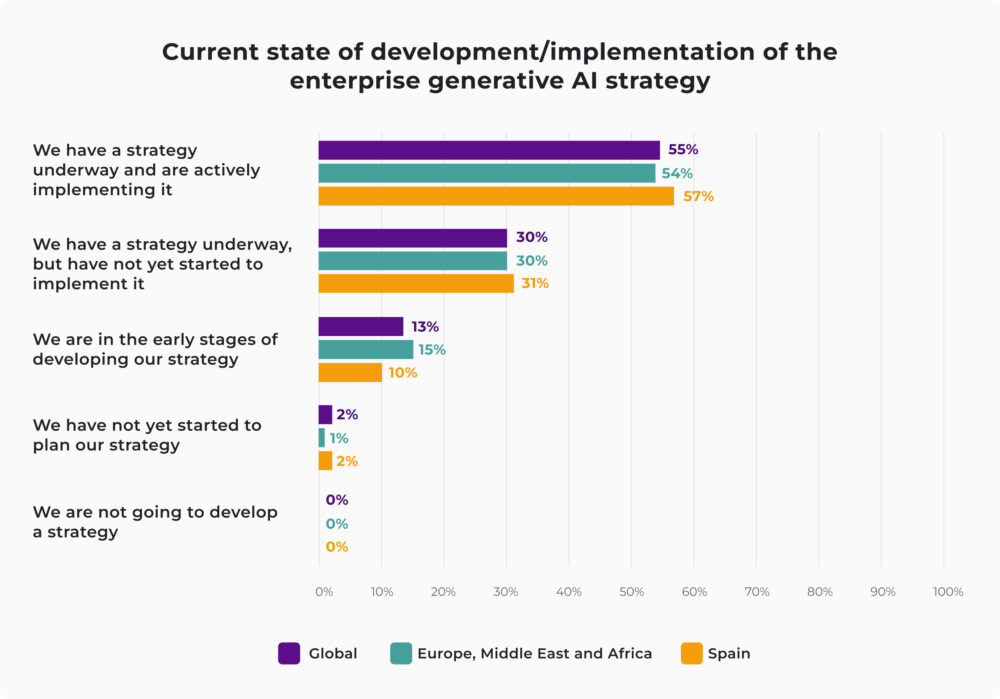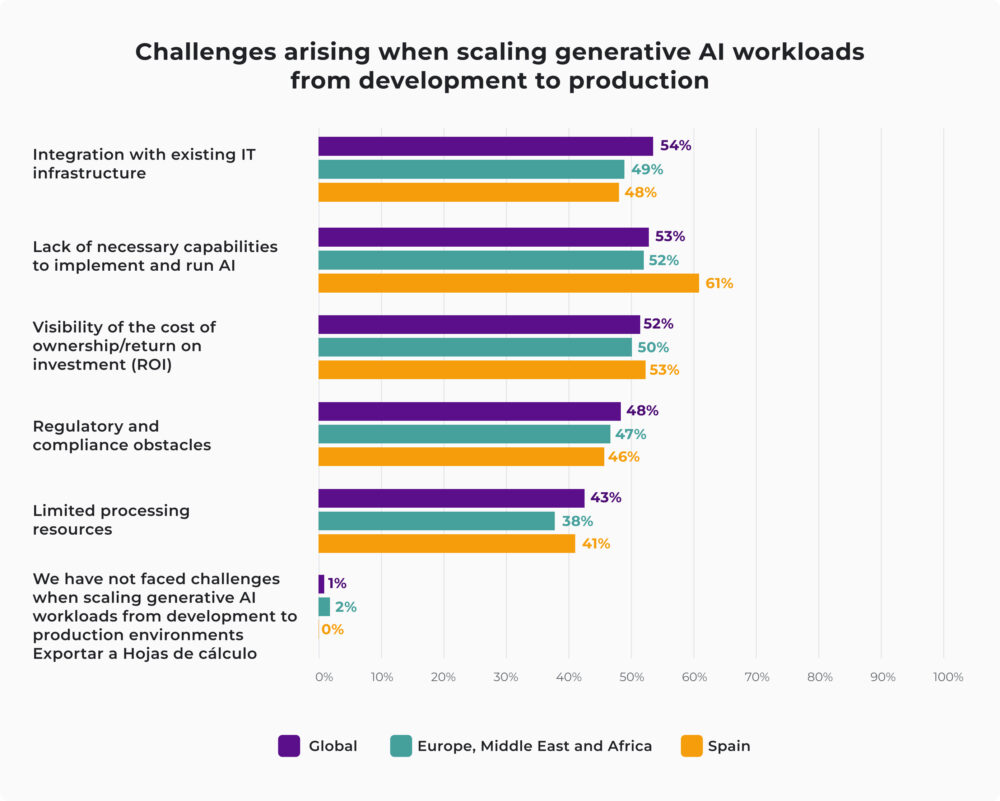Spanish Companies Lead Global Adoption of Generative Artificial Intelligence
The Spanish business landscape has positioned itself as a pioneer in the implementation of emerging technologies, consolidating its leadership in Generative Artificial Intelligence. The latest data reveals that nine out of ten organisations in the country have already integrated GenAI strategies into their operations.
Figures that place Spain above the global average
The seventh edition of the Enterprise Cloud Index, produced by Nutanix together with the consultancy Vanson Bourne, confirms that 88% of Spanish companies have developed and implemented a comprehensive generative artificial intelligence strategy. This figure surpasses both the global (85%) and European regional (84%) averages, positioning the country as a leader in technology adoption.
Source: Enterprise Cloud Index – Country Report: Spain, 2025
The study analysed the responses of 1,500 IT and DevOps managers during the autumn of 2024. It showed that in only 10% of Spanish organisations, the implementation of Generative AI remains in the development phase, highlighting the speed of implementation in the domestic market.
Jorge Vázquez, General Manager of Nutanix Iberia, explains that the motivations for adopting GenAI vary significantly between organisations:
“The implementation objectives are diverse: some seek to be more innovative, others to improve productivity, and many to advance in automation“.
This diversification is reflected in the specific usage data: 53% of companies prioritise cybersecurity, fraud detection and loss prevention projects. On the other hand, 45% focus their efforts on automating customer service using chatbots.
Source: Enterprise Cloud Index – Country Report: Spain, 2025
Comparative perspective with other studies
The results of the Enterprise Cloud Index partially contrast with other recent research. Deloitte reports that 72% of Spanish companies plan to increase their investment in generative AI during the next fiscal year, with 27% projecting increases of over 20%. Meanwhile, Amazon Web Services indicates that 50% of Spanish companies use generative AI, exceeding the European average of 42%.
The Bank of Spain, using data from its Business Activity Survey, presents more conservative figures: 20% of companies use artificial intelligence in their operations, although 60% of these are doing so in an experimental phase. This methodological difference suggests different criteria for defining “strategic adoption” versus “experimental use”.
Main challenges identified
The shortage of specialised talent emerges as the most significant obstacle to the successful deployment of GenAI. Organisations recognise limitations in knowledge and specific training to design and implement solutions from scratch.
Source: Enterprise Cloud Index – Country Report: Spain, 2025
In terms of technology, security is the main concern. 93% of organisations state that GenAI has transformed their strategic priorities, placing data protection and privacy at the centre of their decisions. Significantly, 92% recognise that they could strengthen the security of their models, especially in managing large language models and sensitive data.
Optimistic profitability expectations
Unlike the caution seen in other international markets, Spanish companies maintain a positive outlook on the return on investment in GenAI. The majority of technology managers are confident that their projects will generate returns in the medium to long term. Only 19% anticipate losses in the next three years.
This confidence is based on the organisational willingness to integrate innovation as a central element of business growth.
The accelerated adoption of GenAI in Spain is part of a rapidly evolving technological ecosystem. According to data from the National Observatory for Telecommunications and the Information Society, companies mainly use AI for written language analysis (44.7%) and workflow automation. This trend positions the country as a European leader in corporate digital transformation.
Spain facing the challenge of consolidating its leadership in generative AI
The picture painted by studies on Generative Artificial Intelligence in Spain reflects more than just positive data: it shows a change in mindset. Companies have gone from seeing AI as a distant promise to genuinely integrating it into their day-to-day operations. Their objectives are as diverse as improving productivity, strengthening security or innovating in customer relations. This enthusiasm is not without its challenges, especially regarding the lack of specialised talent and secure data management. But it makes it clear that technology has become a driver of competitiveness.
In this context, it is not just about implementing AI in internal processes. It is also about harnessing its potential to better understand what is happening outside the organisation: the market, consumers and competitors. This is where AI-powered market analytics solutions, such as flipflow, come into play, which help retail companies access real-time insights. With tools like these, data ceases to be scattered numbers and becomes faster, more accurate and, above all, strategic decisions aligned with an increasingly digital future.
Spain has already shown that it can lead the adoption of Generative Artificial Intelligence in Europe. The real challenge now is to maintain that leadership, turning innovation into a sustained competitive advantage and an inspiration for other markets that are closely watching this progress.






